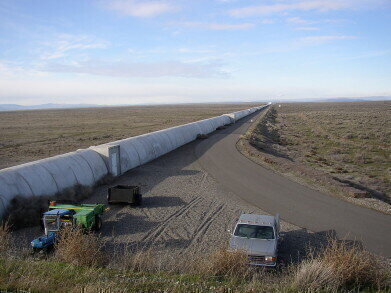-
 Norther leg of LIGO interferometer on Hanford reservation
Norther leg of LIGO interferometer on Hanford reservation
News & Views
UK plays key role in Gravitational Wave Detector launch
Jun 29 2015
Advancements to facilities behind a major research project searching for evidence of the existence of gravitational waves, or ripples in space-time, could be key to opening a new window to the otherwise invisible ‘dark’ side of the Universe, through direct detection of these transient events. Ripples in space-time are emitted by cataclysmic cosmic events such as exploding stars, merging black holes and/or neutron stars and rapidly rotating compact stellar remnants. The existence of gravitational waves was predicted in 1916 by Albert Einstein as a consequence of his general theory of relativity but the waves have never been observed directly.
The Advanced Laser Interferometer Gravitational-wave Observatories (aLIGO) project is based at the LIGO Hanford facility in the USA, where 4-km-long L-shaped LIGO interferometers use a laser split into two beams that travel back and forth down long beam tubes from which the air has been evacuated. The beams are used to monitor the distance between precisely configured mirrors. According to Einstein's theory, the relative distance between the mirrors will change very slightly when a gravitational wave passes by. The original configuration of LIGO, which operated from 2002-2010, was sensitive enough to detect a change in the lengths of the 4-km arms by a distance one-thousandth the size of a proton. LIGO and UK scientists from STFC’s Rutherford Appleton Laboratory and the Universities of Cardiff, Birmingham, Glasgow and Strathclyde, have contributed to the improved technology at the Advanced LIGO facility.
The new detector will increase the sensitivity of the LIGO instruments by a factor of 10 and provide a 1,000-fold increase in the number of astrophysical candidates for gravitational wave signals. The aLIGO instruments should detect multiple gravitational-wave events each year. UK researchers supplied the suspension technology which holds the interferometer’s mirrors in place, and part of its optical system. The team will also prepare data analysis computing systems in readiness for engineering and science data runs scheduled to start later in the year.
Professor Kenneth Strain, deputy director of the IGR and principal investigator of the Advanced LIGO project team in the UK said “The aLIGO project is immensely important in developing our understanding of the universe, and we’re pleased and proud to have been involved from the start following our close involvement with the original LIGO initiative.”
Digital Edition
Lab Asia 31.2 April 2024
April 2024
In This Edition Chromatography Articles - Approaches to troubleshooting an SPE method for the analysis of oligonucleotides (pt i) - High-precision liquid flow processes demand full fluidic c...
View all digital editions
Events
Apr 28 2024 Montreal, Quebec, Canada
May 05 2024 Seville, Spain
InformEx Zone at CPhl North America
May 07 2024 Pennsylvania, PA, USA
May 14 2024 Oklahoma City, OK, USA
May 15 2024 Birmingham, UK

















